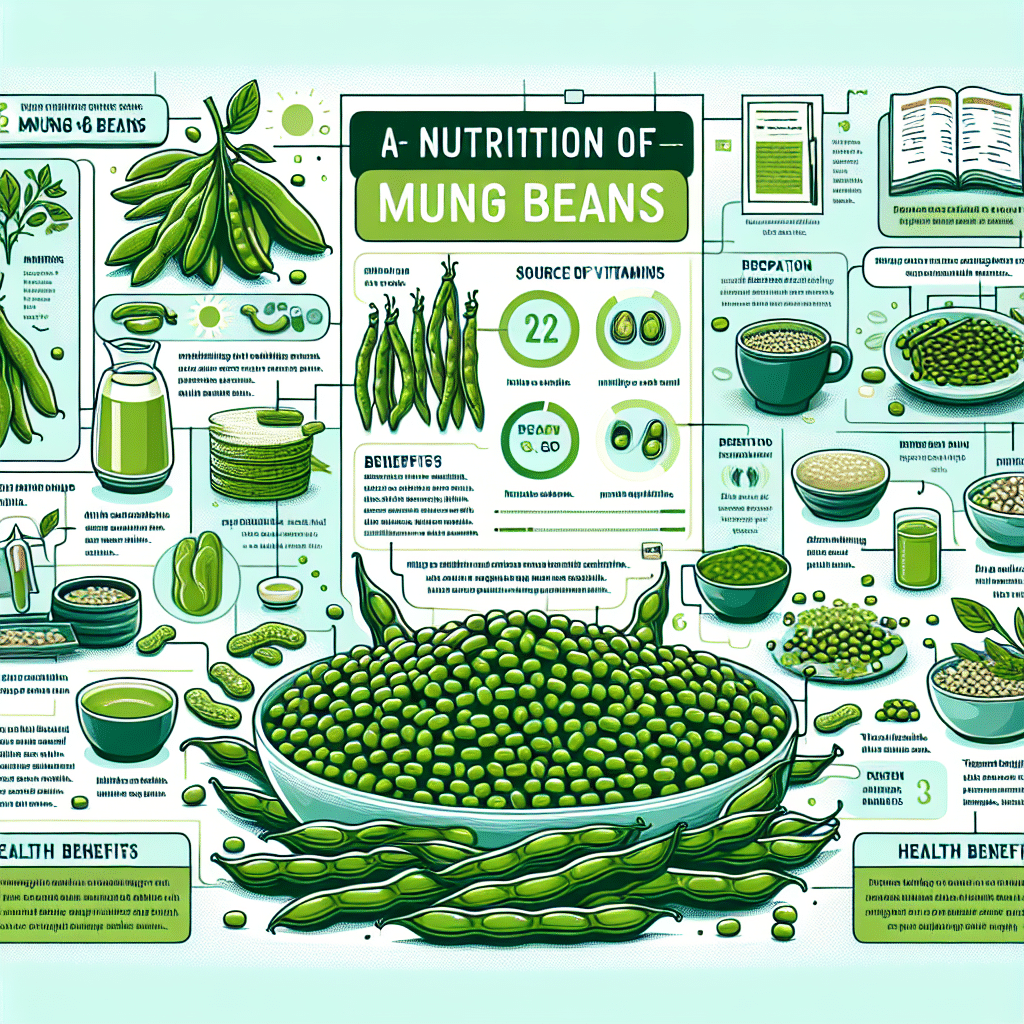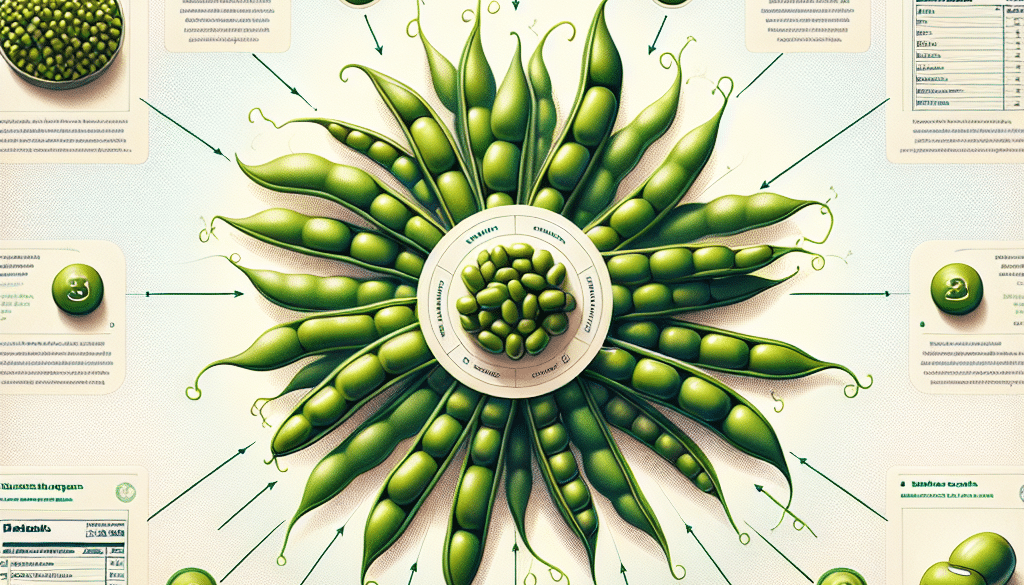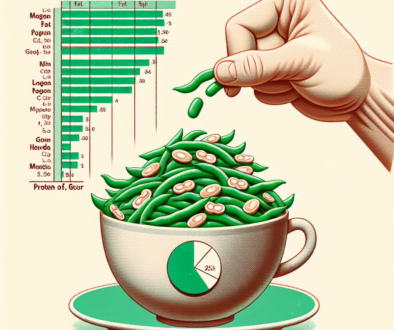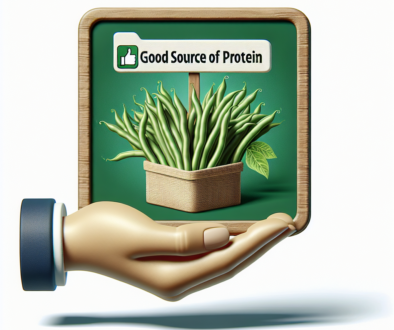Mung Bean Nutrition: A Comprehensive Guide
-
Table of Contents
- Mung Bean Nutrition: A Comprehensive Guide to Health Benefits
- Introduction to Mung Beans
- Nutritional Profile of Mung Beans
- Health Benefits of Mung Beans
- Scientific Research and Case Studies
- How to Incorporate Mung Beans into Your Diet
- Comparison with Other Legumes
- Preparation and Cooking Tips
- Potential Downsides and Considerations
- Conclusion: The Powerhouse of Nutrition
- Discover ETprotein’s High-Quality Protein Products
Mung Bean Nutrition: A Comprehensive Guide to Health Benefits

Mung beans, a staple in many cuisines across Asia, are small, green legumes that pack a powerful nutritional punch. With their growing popularity in the West, particularly among health-conscious consumers and vegetarians, understanding the full spectrum of mung bean nutrition is more important than ever. This comprehensive guide will delve into the myriad of health benefits provided by mung beans, supported by scientific research, case studies, and statistics.
Introduction to Mung Beans
Mung beans (Vigna radiata) are part of the legume family and are believed to have originated in India. They have been cultivated for thousands of years and are a key ingredient in many traditional dishes from India, China, Southeast Asia, and beyond. Mung beans are versatile and can be enjoyed whole, sprouted, or as flour, making them a valuable ingredient in a variety of recipes.
Nutritional Profile of Mung Beans
The nutritional value of mung beans is impressive, as they are rich in vitamins, minerals, proteins, and dietary fibers. Here’s a breakdown of their key nutrients:
- Protein: Mung beans are an excellent source of plant-based protein, which is crucial for muscle repair, immune function, and overall health.
- Fiber: High in dietary fiber, mung beans help promote digestive health and can aid in weight management.
- Vitamins: They are rich in B vitamins, particularly folate (vitamin B9), which is essential for DNA synthesis and repair.
- Minerals: Mung beans contain essential minerals such as potassium, magnesium, iron, and zinc.
- Antioxidants: These beans are packed with potent antioxidants, including flavonoids and phenolic acids, which combat oxidative stress.
Health Benefits of Mung Beans
Mung beans are not only nutritious but also offer a range of health benefits:
- Heart Health: The fiber and antioxidants in mung beans can help reduce bad cholesterol levels, lowering the risk of heart disease.
- Blood Sugar Control: Their low glycemic index and high fiber content make mung beans beneficial for managing blood sugar levels.
- Weight Management: The protein and fiber in mung beans can help you feel full longer, aiding in weight loss efforts.
- Digestive Health: The fiber in mung beans promotes regular bowel movements and a healthy gut microbiome.
- Anemia Prevention: Being a good source of iron, mung beans can help prevent anemia, especially in women of childbearing age.
Scientific Research and Case Studies
Several studies have highlighted the health benefits of mung beans. For instance, research published in the “Journal of Nutrition and Metabolism” found that mung bean extract could effectively lower blood glucose, triglyceride, and cholesterol levels in animal models. Human studies have also shown that mung beans can improve blood sugar control in individuals with type 2 diabetes.
Case studies from various parts of the world where mung beans are a dietary staple suggest that populations consuming these legumes regularly may have lower incidences of certain chronic diseases, such as type 2 diabetes and cardiovascular diseases.
How to Incorporate Mung Beans into Your Diet
There are countless ways to enjoy mung beans:
- As a main dish: Cooked mung beans can be used in curries, stews, and soups.
- In salads: Sprouted mung beans add a crunchy texture and nutritional boost to any salad.
- As a dessert: Mung bean paste is a common filling for Asian sweets and pastries.
- In smoothies: Mung bean protein powder can be added to smoothies for an extra protein kick.
Comparison with Other Legumes
When compared to other legumes like lentils, chickpeas, and black beans, mung beans hold their own in terms of nutritional value. They are particularly high in protein and fiber while being lower in calories, making them an excellent choice for those looking to maintain a healthy weight.
Preparation and Cooking Tips
To get the most out of mung beans’ nutritional benefits, proper preparation and cooking are key:
- Soaking: Soak mung beans in water for several hours to reduce cooking time and improve digestibility.
- Cooking: Simmer soaked mung beans until tender, which typically takes about 45 minutes.
- Seasoning: Mung beans have a mild flavor, so they pair well with a variety of spices and herbs.
Potential Downsides and Considerations
While mung beans are generally safe for most people, some may experience digestive issues due to their high fiber content. Introducing them gradually into the diet can help mitigate this. Additionally, those with legume allergies should avoid mung beans.
Conclusion: The Powerhouse of Nutrition
Mung beans are a nutritional powerhouse that can offer numerous health benefits. Their high protein, fiber, vitamin, and mineral content make them an excellent addition to any diet. By incorporating mung beans into your meals, you can take advantage of their health-promoting properties while enjoying a variety of delicious dishes.
Discover ETprotein’s High-Quality Protein Products
If you’re looking to enhance your diet with high-quality protein sources, consider ETprotein’s range of plant-based protein products. Their mung bean protein is just one of the many organic, non-GMO, and allergen-free options they offer to support your health and wellness goals.
About ETprotein:
ETprotein, a reputable protein Chinese factory manufacturer and supplier, is renowned for producing, stocking, exporting, and delivering the highest quality organic bulk vegan protein and plant proteins. They include Organic rice protein, clear rice protein, pea protein, clear pea protein, pumpkin seed protein, sunflower seed protein, mung bean protein, etc. Their offerings, characterized by a neutral taste, non-GMO, allergen-free attributes, cater to a diverse range of industries. They serve nutraceutical, pharmaceutical, cosmeceutical, veterinary, as well as food and beverage finished product distributors, traders, and manufacturers across Europe, USA, Canada, Australia, Thailand, Japan, Korea, Brazil, and Chile, among others.
ETprotein specialization includes exporting and delivering tailor-made protein powder and finished nutritional supplements. Their extensive product range covers sectors like Food and Beverage, Sports Nutrition, Weight Management, Dietary Supplements, Health and Wellness Products, and Infant Formula, ensuring comprehensive solutions to meet all your protein needs.
As a trusted company by leading global food and beverage brands and Fortune 500 companies, ETprotein reinforces China’s reputation in the global arena. For more information or to sample their products, please contact them and email sales(at)ETprotein.com today.














